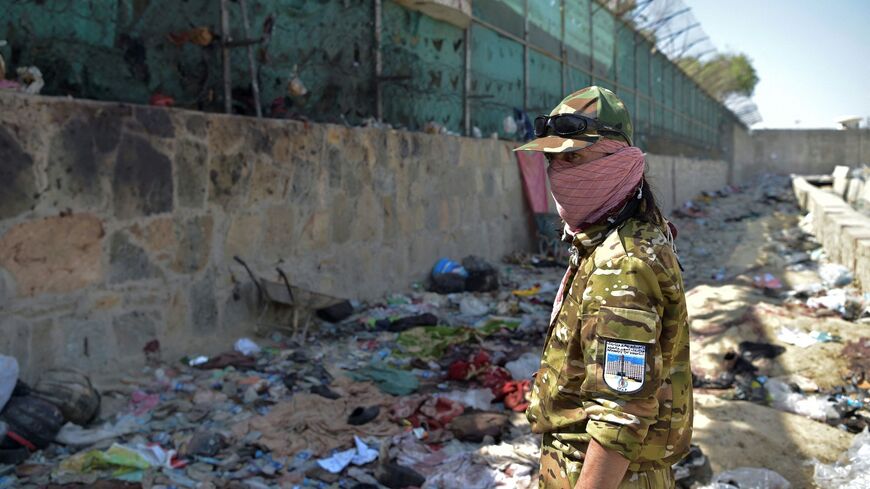The Taliban killed the Islamic State official believed to have planned the suicide bombing at Kabul Airport's Abbey gate that killed 13 American troops and more than 170 civilians amid the chaotic US withdrawal from Afghanistan in 2021, a senior White House official said Tuesday.
"The ISIS-K terrorist who was the mastermind of the horrific attack at Abbey Gate that killed 13 brave American service members and many others has been removed from the battlefield," White House National Security Council spokesperson John Kirby said in an emailed statement. ISIS-K refers to the Khorasan branch of the Islamic State — the Afghan affiliate of the terror group.
"He was killed in a Taliban operation, which is another in a series of high-profile leadership losses ISIS-K has suffered this year. He was a key ISIS-K official directly involved in plotting operations like Abbey Gate, and now is no longer able to plot or conduct attacks," Kirby said, without providing further detail.
The US was not involved in the Taliban operation, another US official said.
Asked Wednesday during a call with reporters whether US intelligence had contributed to the Taliban operation, Kirby replied, “No.”
A top US general with responsibility in the Middle East, US Air Force Lt. Gen. Alexus Grynkewich, affirmed to reporters earlier this year there was no US military coordination with the Taliban against IS' branch in Afghanistan, even as the bloody conflict between the two Islamist factions has ramped up since the American and NATO withdrawal.
"We have confidence that the individual who was the mastermind of the Abbey Gate bombing and directed the attack was killed," another US official speaking not for attribution told Al-Monitor.
Kirby declined to say on Wednesday when asked by Al-Monitor how US intelligence confirmed the official’s identity and word of his death, but alluded to US efforts to build military and intelligence ties in the region to boost visibility on ISIS-Khorasan since the 2021 withdrawal.
"We really have worked hard since we withdraw from Afghanistan to sharpen over the horizon capabilities," Kirby told reporters.
"It's also about being able to see things, to know things, to monitor things," he said, adding, "If you don't have boots on the ground, it's not impossible."
The death of the Abbey gate plotter appears to mark the close of the grim final chapter of the two-decade US war in Afghanistan.
Yet further questions remained following the announcement by Washington. The IS official's name has not been released and the nature and details of the Taliban operation remain unclear, even as Biden administration placed calls throughout the day to inform family members of those killed in the August 2021 attack.
“The Department of Defense continues to maintain multifaceted capabilities to monitor and disrupt ISIS-K,” Pentagon press secretary US Air Force Brig. Gen. Pat Ryder said in a statement released late on Tuesday.
The Biden administration has been roundly criticized by lawmakers from both parties over its handling of the frenetic US withdrawal, which left thousands of Afghans who aided the US-led war effort stranded under a government run by their battle-hardened enemies.
While the Pentagon ultimately characterized the evacuation from Kabul as a success, the operation was marred by a series of deadly incidents that embarrassed Washington and raised the international visibility of both the Taliban and ISIS-K.
As the evacuation began, arriving members of the US Army's 82nd Airborne struggled to secure the airfield as panicked Afghan civilians rushed the tarmac in hopes of escaping the brutal Islamist government.
The breach led the Taliban to help secure the southern side of Hamid Karzai International Airport, an area which was supposed to have been guarded by US-trained Afghan security forces who had abandoned their posts as the Islamists neared the capital.
Pentagon officials initially denied that the Taliban had taken charge of part of the airport, before later acknowledging the crowd control came at US request.
But Taliban checkpoints outside the airport failed to stop an IS suicide bomber, later identified as Abdel Rahman al-Logari, from reaching within meters of the airport's southeastern gate, which had reportedly been held open to admit additional evacuees as the Marines struggled to keep back crowds.
Last February, a Pentagon investigation into the incident concluded it could not have been prevented, and absolved Marines of allegedly firing into the crowd following the blast.
But the military's response to the bombing — a drone strike on a car which Pentagon officials claimed was linked to another imminent plot to attack the airport — ended up killing ten civilians, including an aid worker and at least seven children.
The Pentagon's top general Mark Milley defended the strike as "righteous" before later acknowledging he and other military officials had been wrong.
Editor's note: April 26, 2023. This story was updated to include quotes by Pentagon and White House spokespeople.







